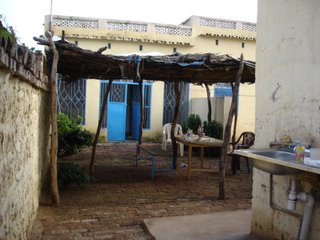 I’m sitting at this table outside where we eat all our meals. For breakfast today I had real cornflakes (a luxury procured from the African Union troops, I think) with powdered milk, and tea. Failing cornflakes we usually have a flat, round salt-less bread and tea. Lunch and supper are pretty good, the cook has come up with some vegetarian things to eat with the obligatory rice; aubergine ratatouille type mixture, cooked chard/spinach, and lentil dhal (but the lentils are also a procured luxury, and the supply is limited). My favourite so far has been yummy fresh eggs and greasy chips. The only problem, as we were discussing over dinner the other night, is that everything seems to have a certain amount of grit in it. The spinach especially has a sandy crunchy texture which is most unpleasant, and means the best thing to do is simply avoid chewing and swallow quickly. So, there is stuff to eat, and at this rate I’m not going to lose 5-15 kilos, as lots of other international staff seem to have done.
I’m sitting at this table outside where we eat all our meals. For breakfast today I had real cornflakes (a luxury procured from the African Union troops, I think) with powdered milk, and tea. Failing cornflakes we usually have a flat, round salt-less bread and tea. Lunch and supper are pretty good, the cook has come up with some vegetarian things to eat with the obligatory rice; aubergine ratatouille type mixture, cooked chard/spinach, and lentil dhal (but the lentils are also a procured luxury, and the supply is limited). My favourite so far has been yummy fresh eggs and greasy chips. The only problem, as we were discussing over dinner the other night, is that everything seems to have a certain amount of grit in it. The spinach especially has a sandy crunchy texture which is most unpleasant, and means the best thing to do is simply avoid chewing and swallow quickly. So, there is stuff to eat, and at this rate I’m not going to lose 5-15 kilos, as lots of other international staff seem to have done.Sitting here earlier today, the cook was helping me with my Arabic, and I was helping her clean up and teaching her bits of English in exchange. She makes me laugh so much. It’s been a very happy weekend.